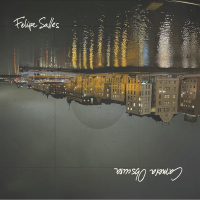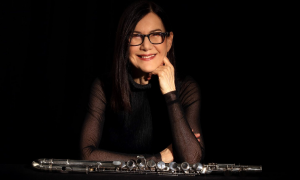Home » Jazz Articles » Interview » Joanne Brackeen: Phenomenal Capacity
Joanne Brackeen: Phenomenal Capacity

Teddy Edwards
saxophone, tenor1924 - 2003

Harold Land
saxophone, tenor1928 - 2001

Charles Lloyd
saxophoneb.1938

Dexter Gordon
saxophone, tenor1923 - 1990

Art Blakey
drums1919 - 1990

Joe Henderson
saxophone1937 - 2001

Stan Getz
saxophone, tenor1927 - 1991

Bill Evans
piano1929 - 1980

Michael Brecker
saxophone, tenor1949 - 2007

Cecil McBee
bassb.1935

Billy Hart
drumsb.1940

Eddie Gomez
bassb.1944

Jack DeJohnette
drumsb.1942
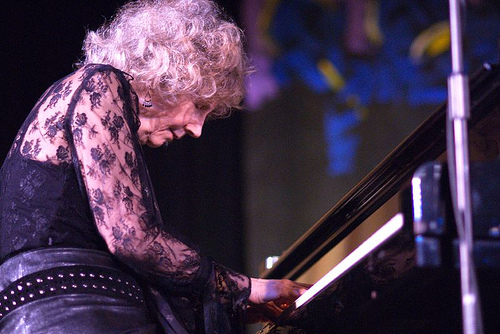
All About Jazz: Let's start with what you're doing. You have a couple of gigs coming up now. You'll be doing a duo at the Knickerbocker just before this interview comes out [January, 2010].
JoAnne Brackeen: That's right, with Cecil McBee.
AAJ: So that will hail back to the kind of gigs you used to do at Bradley's, where you often worked, as did most of the other great New York pianists?
JB: Yes, we'll do a lot more standards there, but that's a lot of fun. I enjoy that, too. As long as it's not, you know, too much.
AAJ: And you'll be at The Kitano this month.
JB: That will be with a trio—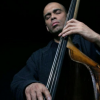
Ugonna Okegwo
bass
Adam Cruz
drums
b.1970
AAJ: You're a highly regarded composer. Are you writing all the time?
JB: Always, always. I've got seven new tunes [from 2009]. Starting out with "Year of the Ox." And we did "Malibu," "Crystal Palace," "Upper Pearls" and "Crock's Stilettos." We did those at Jazz Standard [last summer] and then there are two more that we didn't get to.
AAJ: But you haven't recorded an album of new compositions in a while then.
JB: No, and we have a lot of ideas, you know. I'm a professor up at Berklee and some of the people working there, I don't know if you're totally aware, but one of them is 
Greg Osby
saxophone
b.1960
AAJ: How long have you been doing that?
JB: I've been doing that for quite a while. Not full time, but say full time for about eight years. It's great for me because I never did that in my career before at all. And I didn't even think that I would ever want to. But they asked me up to do a concert and they put a clinic right—I can't remember if it was right before or right after the concert—and the questions that I got asked at that clinic were amazing and so I was kind of intrigued and then Cecil McBee is a professor at the New England Conservatory up there and also 
Fred Hersch
piano
b.1955
AAJ: A residency?
 JB: A residency, right, but you have to teach for three days a week. I just told them "Look, if you can give me one day I'll do it and you can get somebody else for the other two." And they did and I got a taste for it and it was just great. So I went ahead and little by little began to work with the college full time.
JB: A residency, right, but you have to teach for three days a week. I just told them "Look, if you can give me one day I'll do it and you can get somebody else for the other two." And they did and I got a taste for it and it was just great. So I went ahead and little by little began to work with the college full time.
AAJ: It's a whole different world these days from the way you came up.
JB: Yeah, it is, but you know what, I get to teach all that I learned on my own. And that is not the kind of teachers that they have had in many of the institutions of learning.
AAJ: What are some of the lessons you try to impart to your students?
JB: Just what you hear when you hear me play. In any way that I can. You know, every student is different, learns differently, has different models and so on and so forth and I just get right in there and help them in a way that I imagine would have been a lot of fun for me if I had been born a few years later (laughs) and was learning from a teacher like that.
AAJ: Who were some of the pianists you heard early on who inspired you?
JB: Well, probably there was Bud Powell and then came along—there were a lot of people, but if I just mention the main ones you'll know what I like. McCoy Tyner came after that and then I moved to New York and I met 
Chick Corea
piano
1941 - 2021
Keith Jarrett
piano
b.1945
Herbie Hancock
piano
b.1940
AAJ: What about on the West Coast when you first started playing?
JB: There weren't that many... you know, I was more impressed, most impressed, with 
Ornette Coleman
saxophone, alto
1930 - 2015
Bobby Hutcherson
vibraphone
1941 - 2016
Teddy Edwards
saxophone, tenor
1924 - 2003
Harold Land
saxophone, tenor
1928 - 2001
AAJ: You were pretty much out there on your own as a female instrumentalist in those days.
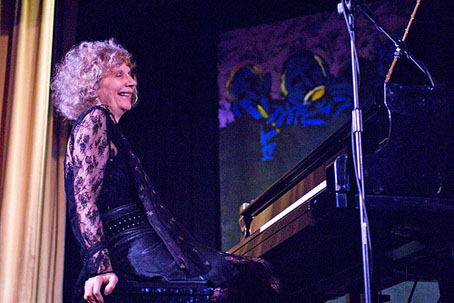
JB: Yeah, there was nobody else playing. I don't know why. I had one friend, named Jane Getz, who played piano, but she kind of went into other areas.
AAJ: Did you find much resistance?
JB: No, nobody said anything. I didn't even know. I moved to New York, I worked. I worked with Joe Henderson, Stan Getz, Art Blakey and one day after that they called me for the first Women In Jazz concert and that was when I began to feel they had this thing that the women weren't getting enough...whatever. But it is true that if you are a woman and you play, you better play really, really well.
AAJ: So you are one of the first females to get out there and show that it wasn't that big a deal.
JB: I didn't try to do that. I had no idea that anything was going on, but if you look at—let's see—
Mary Lou Williams
piano
1910 - 1981
Marian McPartland
piano
1918 - 2013
Dorothy Donegan
piano
1924 - 1998
AAJ: Do the female students at Berklee approach you differently than the male students?
JB: Not anymore. When I first taught up there, there was never a woman as strong as a guy in a class or in all of my students. Now there is absolutely no difference. The best student in a class is just as likely to be a woman as a guy. So it's pretty amazing.
AAJ: And how did you first become enamored with Brazilian music?
JB: I always was, from first hearing. I did go to Cuba and also Brazil with Stan Getz, so that was the first meeting, which I never forgot.
AAJ: What are some things that you haven't done that you think you might like to do.
JB: Well I did study at Berklee, for a couple of months, big band arranging. I'm half way through one of my compositions for big band and I think that that would be fun. At least a couple of my tunes would be great that way. Other people have arranged them and of course I've performed big band arrangements of my tunes, but always somebody else arranged them. But I really like the sound of an orchestra; I would like my music played orchestral. That would be great.
Selected Discography
Joanne Brackeen, Pink Elephant Magic (Arkadia Jazz, 1998)
Joanne Brackeen, Power Talk (Turnipseed Music, 1994)
Joanne Brackeen, Fi-Fi Goes to Heaven (Concord, 1986)
Joanne Brackeen, Ancient Dynasty (Tappan Zee-Columbia, 1980)
Joanne Brackeen, Mythical Magic (MPS-Pausa, 1978)
Joanne Brackeen, Snooze (Six Ate) (Choice-Candid, 1975)
Photo Credit
Ed Berger
Tags
Comments
PREVIOUS / NEXT
Support All About Jazz
 All About Jazz has been a pillar of jazz since 1995, championing it as an art form and, more importantly, supporting the musicians who make it. Our enduring commitment has made "AAJ" one of the most culturally important websites of its kind, read by hundreds of thousands of fans, musicians and industry figures every month.
All About Jazz has been a pillar of jazz since 1995, championing it as an art form and, more importantly, supporting the musicians who make it. Our enduring commitment has made "AAJ" one of the most culturally important websites of its kind, read by hundreds of thousands of fans, musicians and industry figures every month.
Go Ad Free!
To maintain our platform while developing new means to foster jazz discovery and connectivity, we need your help. You can become a sustaining member for as little as $20 and in return, we'll immediately hide those pesky ads plus provide access to future articles for a full year. This winning combination vastly improves your AAJ experience and allow us to vigorously build on the pioneering work we first started in 1995. So enjoy an ad-free AAJ experience and help us remain a positive beacon for jazz by making a donation today.

New York City
Concert Guide | Venue Guide | Local Businesses
| More...







 Buy Now
Buy Now





